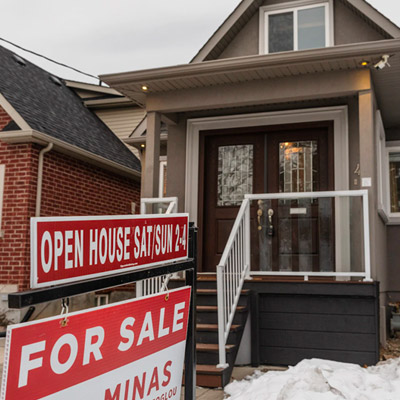Buying a home is the largest financial decision most people will ever make, says Karen Hoskins, vice president of National Homeownership Programs for NeighborWorks America. Homeownership is also one of the best ways to build wealth. "Making sure you're educated and knowing what your options are before you begin your search is a critical first step."
Each year, NeighborWorks network organizations help thousands of residents continue on their path to homeownership. Homebuying season looks different this year, with historic unemployment and stay-at-home orders spurred by COVID-19. But many things remain the same.
Even in the midst of a pandemic, residents continue to go through online education and counseling programs to learn how to save and prepare for buying a home. And even if some tours for homes on the market are virtual, people are still looking for houses.
"When COVID-19 first hit, whether people were buying or selling, they stopped in their tracks, in Virginia and nationwide," says Lisa Sturtevant chief economist for Virginia Realtors. "That lasted for about two weeks."
New listings were down in areas. And some states, like Pennsylvania and Michigan, imposed strict restrictions, preventing realtors from doing in-person business until May. "But those outliers aside, in many other places, the real estate market was able to continue with open houses and lots of virtual tours."
Sturtevant says that as market activity has resumed, she finds differences this season are less state to state and more family to family. Unemployment claims continue to climb — and reached $41 million the week of May 25. But there are those who haven't seen a significant change in finances and who remain in the homebuyer pool.
People who work in service industries like bars and restaurants may be more worried about keeping food on their own tables than buying a home, for example. But often, those workers are younger and more likely to be renting, Sturtevant says. "I do feel that if your own personal situation feels solid, there's nothing that says 'don't do it.'" Federal Housing Administration loans are still flexible, she says, and rates are still good, an advantage for first-time homebuyers.
In the spring, "people tend to start thinking about and planning for the future and what's next," says Hoskins. Many may have just received a sizable tax refund and are considering buying a home as a way of investing that money.
 The important thing is to be prepared, Hoskins says. It's important to get your financial house in order before you buy. And that's an area where NeighborWorks America's network organizations, most of them U.S. Department of Housing and Urban Development (HUD)-approved counseling agencies, are trained to help. They can provide prospective buyers with education, help them get prequalified for a mortgage and equip them with information that will make it easier to navigate the real estate landscape.
The important thing is to be prepared, Hoskins says. It's important to get your financial house in order before you buy. And that's an area where NeighborWorks America's network organizations, most of them U.S. Department of Housing and Urban Development (HUD)-approved counseling agencies, are trained to help. They can provide prospective buyers with education, help them get prequalified for a mortgage and equip them with information that will make it easier to navigate the real estate landscape.
In fact, in the past two years, NeighborWorks America's network organizations provided financial capability counseling and education to more than 10,000 households. And in fiscal year 2019, they created 26,244 new homeowners throughout the United States and Puerto Rico.
Hoskins offers important tips for first-time homebuyers before they begin their homebuying journey:
- Educate yourself: Gain a solid understanding of what's involved in a home purchase along with the responsibilities of home ownership. To do that, Hoskins recommends connecting with a HUD-approved counseling agency. "Learn what you need to know in order to make informed decisions that will lead to your becoming a successful homeowner over the long term," Hoskins says.
- Get preapproved for a mortgage: "Part of the value in becoming pre-approved is learning if you're ready to buy a home or not," Hoskins says. Start with a review of your credit and find out how much of a home you can afford based on your income. Know what your mortgage payments would be before you start your housing search. If you're ready, knowing how much you can afford is invaluable. If there are barriers to your mortgage readiness, HUD-approved counseling agencies can help you address those things. Hoskins says she often hears of people searching for a home before they know what they can afford — and being disappointed when they find that the house they just fell in love with is out of reach.
- Find out if you qualify for mortgage financing programs: There are a variety of down-payment assistance programs available in the market if you meet certain eligibility requirements, Hoskins says, and many of them are specifically for first-time homebuyers. "It may not be as expensive to buy as you think it is," she says. "There's a long-standing myth that if you buy a home you need a 20-percent down payment. But there are some programs where you'll need as little as 3.5 percent of the purchase price." Down payment assistance programs can also help make out-of-pocket costs even less.
- Get references to a good real estate professional: A referral form a HUD-approved counseling agency or family and friends can connect you with someone to help you find a home. "A professional can support your search to find a home in your price range and a home that meets your specific needs," Hoskins says.
- Get a home inspection: "Know before you buy," Hoskins says. "Don't assume you can walk through a home and know it's true condition." Home inspectors evaluate every aspect of the construction of a home and provide a report on the findings. Inspections have continued during COVID, though with new guidelines and protocols.

